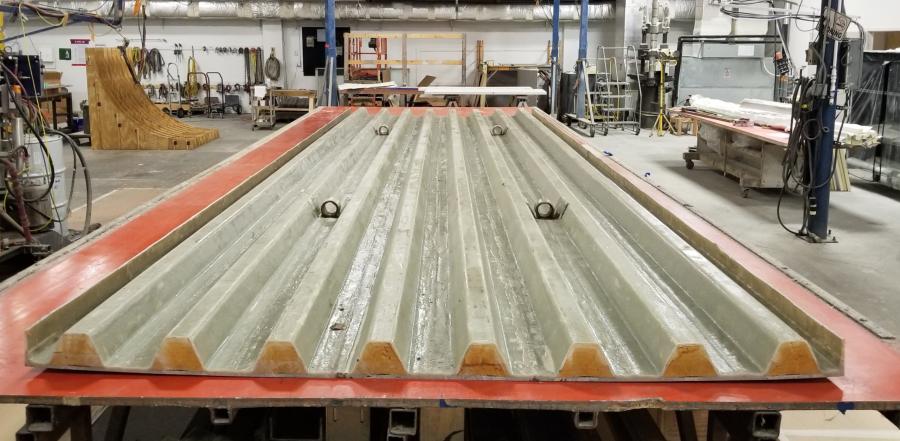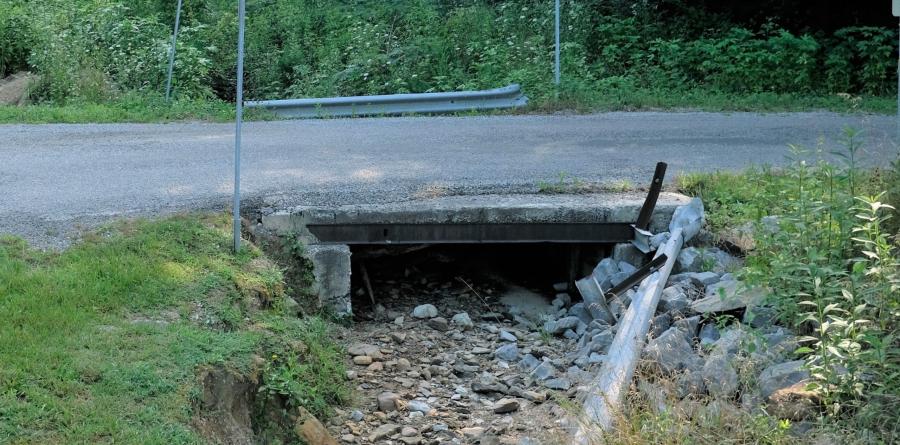Located one-hour northwest of Knoxville on Elizabeth Church Road, the two-lane bridge has needed repair for many years, Morgan County Highway Superintendent Joe Henry Miller said. (The Institute for Advanced Composites Manufacturing Innovation photo)
A damaged, decades-old concrete bridge just off a narrow, curvy rural road in north central Tennessee's Morgan County will soon come down, and a low-cost, low-maintenance, technologically advanced composites bridge deck system with a 100-year lifespan will take its place.
It is all part of a privately funded infrastructure project aimed at demonstrating fiber-reinforced polymer composite materials, or FRPs, as a fast and easy sustainable solution for improving the thousands of structurally deficient rural bridges that plague financially strapped counties across the United States.
Located one-hour northwest of Knoxville on Elizabeth Church Road, the two-lane bridge has needed repair for many years, said Morgan County Highway Superintendent Joe Henry Miller.
He and county officials are partnering with private industry and researchers at the University of Tennessee (UT) and the university's Institute for Advanced Composites Manufacturing Innovation, or IACMI — The Composites Institute, in Knoxville, to create an affordable bridge that can be installed quickly and will safely meet transportation needs in the rural community.
"For more than 20 years, FRP composites have been used in bridge applications, and they've met and exceeded all performance and safety standards set by the Association of State Highway and Transportation Officials [AASHTO]," said John Unser, IACMI technology impact manager. "But when it comes to composite bridge decking, many transportation departments across the country are unfamiliar with the technology.
"As part of our objectives for sustainability and strategic planning, our goal in this demonstration is to develop a comprehensive case study for comparing the total costs of a typical concrete bridge and one using an FRP bridge deck. We will share the case study framework and results with federal, state and local officials, transportation departments and the civil engineering community so FRP composites will be more of a 'known' to them," Unser added.
The next-generation composites bridge deck design has already been tested in Oklahoma and Missouri, Unser said, and those trials have provided a greater understanding of the bridge's strength properties and confidence in the long-lasting, low-maintenance design.
Fiber-reinforced polymer composites products produced in the United States offer durable, sustainable and cost-effective solutions not only in bridges but in a variety of infrastructure and transportation applications as well, including highways, dams, railroads, semi-trailers, aircraft, waterfront structures, utility poles and buildings.

The bridge surface, being produced by Florida-based Structural Composites Inc., will have double 8 ft. x 25 ft. fiber reinforced polymer deck panels. (The Institute for Advanced Composites Manufacturing Innovation photo)
The Morgan County demonstration bridge has caught the attention of the Tennessee Department of Transportation (TDOT), a supporter of accelerated and innovative bridge design and construction techniques.
"The use of fiber reinforced polymer bridge deck units, as being coordinated by the University of Tennessee and IACMI, has the potential to greatly enhance the performance, durability and service life of our low volume rural bridge network across the state," said Ted Kniazewycz, TDOT structures division director.
A team of researchers at UT's Fibers and Composites Manufacturing Facility is working with IACMI and the bridge project team to equip the new FRP bridge deck with high-density fiber optic sensors and a wireless sensor module system to monitor the composite bridge deck system while in service.
Jeff McCay, CEO of Chattanooga-based Composite Applications Group (CAG) has been instrumental in getting the rural bridge project off the ground.
"We have pulled together a unique team of public-private partners to address a specific need that exists in many rural communities in Tennessee and across the country: structurally deficient or obsolete bridges," he said.
When McCay learned Morgan County officials were looking for a highly durable, low-maintenance solution to replace the bridge, he saw an opportunity to incorporate composite bridge technology from Structural Composites and began discussions with IACMI and UT, along with in-state excavating contractor McKinney Excavating Inc. of Athens, TN.
The four private corporations — Structural Composites Inc. in Melbourne, Fla., CAG, Luna Innovations in Roanoke, Va., and McKinney Excavating have committed to designing, fabricating, shipping, installing and monitoring the 16-by-25-ft. bridge deck, all at no cost to Morgan County.
"More than 150,000 bridges in the U.S., many located in rural parts of the country, are in need of replacement," explained Structural Composites President Scott Lewit. "Composites bridge deck technology can provide rural communities with a low-cost, lightweight bridge structure that requires less equipment, making a shorter period for on-site preparation and a vastly shorter period for on-site installation."
Lewit said that while his company is producing the bridge deck, or surface, at its Florida plant, his long-term vision is to deploy the "easy-to-build technology across the U.S. industrial base of composite fabricators.
"It moves infrastructure construction from the field into the factory, allowing for prefabrication in a controlled environment and very rapid field installation that minimizes installation traffic impacts," he said.
A shorter installation time is especially critical in single-access locations, which are more common in rural areas than urban. And for rural counties struggling with tight budgets, faster completion can mean significant savings in time and money.
The installation of the composites bridge deck in Morgan County, Tenn., is expected to be completed later this year or in early 2021.
Today's top stories



















